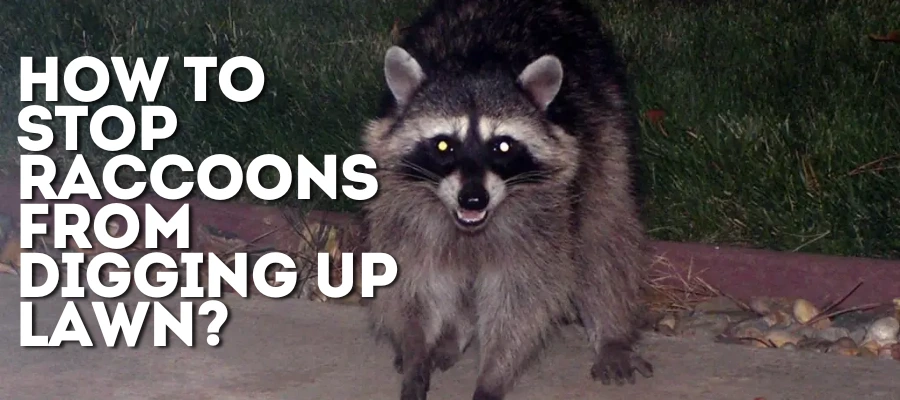Raccoons may look adorable, but they can wreak havoc on your lawn. If you’ve noticed these critters digging up your yard, you’re not alone. Raccoons are notorious for their late-night escapades, which can leave your lawn looking like a battlefield.
In this guide, we’ll explore practical solutions about How to Stop Raccoons from Digging Up Lawn? focusing on three key methods: eliminating food and water sources, using scent repellents, and securing your garden.
Why Do Raccoons Dig Up Lawns?
Raccoons are naturally curious and resourceful creatures. They dig up lawns in search of food, water, or shelter. Common motivations include:
Searching for Grubs: Raccoons love to dig for grubs and other insects that reside in the soil.
Seeking Water: Ponds, pools, and even pet water bowls can attract these nocturnal animals.
Finding Shelter: Raccoons may be looking for a cozy spot to nest or hide.
The damage they cause can range from minor disturbances to significant destruction, impacting the aesthetic and health of your lawn.
Eliminate Food and Water Sources

Identifying Potential Food and Water Sources
To deter raccoons, start by removing anything that might attract them. Here’s a list of common culprits:
Trash Cans: Raccoons are notorious for rummaging through garbage.
Pet Food Bowls: Leftover pet food can be a tempting treat.
Bird Feeders: Birds attract more than just avian visitors.
Fish Ponds: A water source can draw raccoons looking for a quick drink or a tasty fish snack.
Swimming Pools: Even empty pools can attract raccoons searching for water.
Steps to Secure Food and Water Sources
Here’s how to make your yard less appealing to raccoons:
Secure Trash Cans: Store trash cans in a garage or shed. Use raccoon-proof lids or bungee cords to keep them tightly sealed.
Bring Pet Food Indoors: Store pet food indoors, especially during the evening hours when raccoons are most active.
Cover Ponds and Pools: Use sturdy covers for fish ponds and swimming pools. Ensure that the covers are secure to prevent raccoons from accessing the water.
Treat Your Lawn for Grubs: Regularly apply grub control treatments to reduce the food source for raccoons.
Benefits of Removing Food and Water Sources
By eliminating these attractants, you’ll make your yard a less inviting place for raccoons. Without a reason to visit, they’ll likely move on to find more hospitable surroundings.
Use Scent Repellents

Types of Scent Repellents
Raccoons rely heavily on their sense of smell, so using strong scents can be an effective deterrent. Here’s a rundown of popular options:
Natural Repellents
Garlic: Mix crushed garlic with water and spray it around your yard.
Vinegar: Its pungent odor can keep raccoons away. Mix with water and apply to raccoon frequent areas.
Cayenne Pepper: Create a solution with water and cayenne pepper, then spray it around your lawn.
Commercial Repellents
Predator Urine: Purchase wolf, bobcat, or coyote urine from garden centers. These scents mimic predator presence, which can scare raccoons away.
Raccoon Eviction Fluid: Specially formulated to repel raccoons and other wildlife.
How to Apply Scent Repellents
Mixing Solutions: Combine the ingredients according to the package instructions or use a simple recipe, such as one tablespoon of garlic powder mixed with one quart of water.
Target Areas: Focus on raccoon entry points, frequent spots, and any areas showing signs of digging.
Reapplication: Since scents dissipate over time, reapply every few days or after rain to maintain effectiveness.
Alternative Repellents
Epsom Salt: Sprinkle around your yard as a temporary deterrent.
Cucumber Peels: Scatter peels around the perimeter of your lawn. Raccoons are reportedly repelled by the smell.
Benefits and Limitations of Scent Repellents
While scent repellents can be effective, they often require frequent reapplication. The strong odors might also affect pets or people, so use them thoughtfully. Despite these limitations, they provide a humane way to keep raccoons at bay.
Secure Your Garden

Risks of an Unprotected Garden
Gardens attract raccoons due to the abundance of fruits and vegetables. Without protection, your garden can become a raccoon buffet, leading to extensive damage.
Solutions for Securing Your Garden
Electric Fence:
Setup: Install a low-voltage electric fence around your garden. This will deliver a mild shock to raccoons, discouraging them from entering.
Safety Precautions: Ensure the fence is well-marked to prevent accidental contact by children or pets. Use a fence that is specifically designed for wildlife control.
Natural Barriers:
Thorny Plants: Plant bushes or vines with thorns around the garden. Examples include rose bushes or blackberry vines.
Prickly Vines: Consider using vines like bougainvillea or thistle that are not pleasant for raccoons to navigate.
General Tips and Best Practices
Regular Maintenance and Monitoring
Maintaining a raccoon-free yard requires consistent effort. Regularly check for signs of raccoon activity and make necessary adjustments to your methods. Stay vigilant and proactive to keep your yard secure.
When to Seek Professional Help
If raccoons continue to be a problem despite your best efforts, it might be time to consult a professional wildlife control service. Professionals can offer advanced solutions and help address severe infestations.
Conclusion
Keeping raccoons out of your yard is a manageable task with the right approach. By eliminating food and water sources, using scent repellents, and securing your garden, you can create a raccoon-free environment while respecting these animals’ place in nature. Implement these humane methods to protect your lawn and enjoy a raccoon-free yard.
FAQs
What are the signs of a raccoon infestation?
Look for overturned soil, scattered trash, and raccoon tracks or droppings.
Can I use more than one method at a time?
Yes, combining methods often increases effectiveness. For instance, using both scent repellents and securing food sources can be very effective.
Are there any home remedies that work?
Some home remedies, like essential oils and homemade sprays, can be effective, but they may need frequent reapplication.

